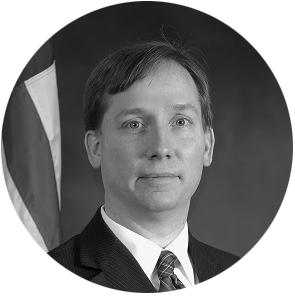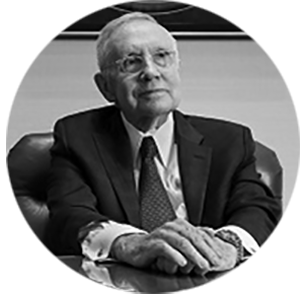Speakers
August 17, 2021
August 18, 2021


Dr. Tim Persons
Chief Scientist
GAO
Dr. Tim Persons is GAO's Chief Scientist and one of two Managing Directors of the Science,
Technology Assessment, and Analytics team. The team conducts technology assessments,
provides oversight of federal science and technology programs, provides technical assistance
on science and technologies issues to the Congress, and develops innovative analytical
techniques for carrying out audits and evaluations.
Tim joined GAO in July 2008. Prior to that, he served in key executive roles at the Intelligence
Advanced Research Projects Activity (IARPA) and the National Security Agency.
Dr. Persons received his B.Sc. in Physics from James Madison University, his M.Sc. in Nuclear
Physics from Emory University, and his M.Sc. in Computer Science and Ph.D. in Biomedical
Engineering from Wake Forest University.

Jon Bateman
Fellow, Cyber Policy Initiative
Carnegie Endowment for International Peace
Read More
Jon Bateman
Fellow, Cyber Policy Initiative
Carnegie Endowment for International Peace
Jon Bateman is a fellow in the Cyber Policy Initiative of the Technology and International Affairs Program at the Carnegie Endowment for International Peace. He previously held technology and strategy roles at the U.S. Department of Defense.
Bateman most recently was special assistant to the Chairman of the Joint Chiefs of Staff, General Joseph F. Dunford, Jr. He led strategic analysis within the Chairman’s internal think tank, including assessments of the technology industry, geopolitical competition, arms control, and military education. Bateman was also the first civilian speechwriter to the Chairman, shaping engagements with global leaders and audiences.
Bateman previously served as director for Cyber Strategy Implementation in the Office of the U.S. Secretary of Defense. He developed the first comprehensive policy for military cyber operations, and helped to establish a unified Cyber Command. Bateman co-founded the central oversight element for all defense cyber activities, the secretary’s Principal Cyber Advisor Staff.
An intelligence officer by training, Bateman was senior intelligence analyst for Iran at the Defense Intelligence Agency. As the agency’s senior expert on Iranian cyber forces, nuclear policy, and political-military leadership, he led a team that produced strategic assessments for the White House and the Pentagon during an era of bilateral upheaval.
Bateman is a graduate of Harvard Law School (JD) and Johns Hopkins University (BA).

Chris Painter
President of the Global Forum on Cyber Expertise Foundation, Associate Fellow
Chatham House
Read More
Chris Painter
President of the Global Forum on Cyber Expertise Foundation, Associate Fellow
Chatham House
Chris Painter is a globally recognized leader and expert on cybersecurity and cyber policy, Cyber Diplomacy and combatting cybercrime. He has been on the vanguard of U.S. and international cyber issues for over thirty years—first as a prosecutor of some of the most high-profile cybercrime cases in the country and then as a senior official at the Department of Justice, FBI, the National Security Council and finally the State Department.
In his most recent government role as the nation’s top cyber diplomat, Mr. Painter coordinated and led the United States’ diplomatic efforts to advance an open, interoperable, secure and reliable Internet and information infrastructure. The pioneering office that Mr. Painter established — the Office of the Coordinator for Cyber Issues — was the first high-level position and office dedicated to advancing the diplomatic aspects of cyber issues ranging from national security to human rights matters.
Prior to joining the State Department, Mr. Painter served in the White House as Senior Director for Cyber Policy in the National Security Council. He was a senior member of the team that conducted the President’s Cyberspace Policy Review in 2009 and subsequently helped create and then structure a new directorate in the National Security Council devoted to these issues.
Among other things, Mr. Painter is currently the President of the Global Forum on Cyber Expertise Foundation, serves on the Board of the Center for Internet Security, is a non-resident Senior Advisor at the CSIS, an Associate Fellow at Chatham House, and is on the Public Sector Advisory Board for Palo Alto Networks. He was also a co-chair of the Ransomware Task Force and a Commissioner on the Global Commission on the Stability of Cyberspace.
Mr. Painter was named the Bartels World Affairs Fellow by Cornell University for 2017-2018, received The Order of the Rising Sun from the Government of Japan for promoting U.S-Japan cyber cooperation in 2018 and received the Order of Terra Mariana from the President of Estonia in 2020 for promoting cyber cooperation. He is also the recipient of the RSA Award for Excellence in the Field of Public Policy (2016), the Attorney General’s Award for Exceptional Service, and the Intelligence Community Legal Award (2008). He is a graduate of Stanford Law School and Cornell University and clerked for US Circuit Judge Betty Fletcher.


Phillip McAlister
Director, Commercial Spaceflight Division
NASA
Philip McAlister joined NASA in 2005, and he is currently the director of the Commercial Spaceflight Division at NASA Headquarters where he advises NASA about issues pertaining to the design, development, and demonstration and services of commercial spaceflight vehicles, systems, and capabilities. McAlister oversees multiple programs at NASA: the Commercial Crew Program, including the Suborbital Crew project; the Commercial Low-Earth Orbit (LEO) Development Program, which includes private astronaut missions to the International Space Station (ISS) and the development of new commercial space destinations; and the Center for the Advancement of Science in Space (CASIS), the nonprofit organization NASA has contracted to manage the ISS National Laboratory.
Prior to this assignment, McAlister oversaw the successful Commercial Cargo Program (i.e., Commercial Orbital Transportation Services) which facilitated the development of the SpaceX Dragon and Northrop Grumman (previously Orbital Sciences) Cygnus cargo transportation systems. He also served as the executive director for the “Review of U.S. Human Spaceflight Plans Committee” (also known as the Augustine Committee). In 2010, he earned NASA’s Exceptional Service Medal.
Prior to NASA, he was a director at Futron Corporation where he managed a division that performed aerospace business analysis and technology assessments. Before joining Futron, he served as a senior manager during a 10-year career at TRW Corporation.
McAlister earned a Master of Business Administration degree from Averett University, a Master of Science degree in Systems Engineering from George Mason University, and a Bachelor of Science degree in Physical Sciences from the University of Maryland.


Sina Beaghley
Senior International/Defense Researcher
RAND
Sina Beaghley joined RAND in 2015 as a senior international/defense policy researcher. Her research focuses on national security policy including counterterrorism, counterintelligence, cyber strategy, personnel and security clearance vetting, and surveillance policy and privacy. She also served as the associate director for the Cyber and Intelligence Policy Center 2017–2021. Beaghley came to RAND after more than a decade of service in the Federal government. She last served as director for Intelligence and Information Security on the National Security Council (NSC) staff where she coordinated the review of intelligence capabilities in response to 2013–2014 unauthorized disclosures related to the National Security Agency (NSA) and advised the President and National Security Advisor on foreign relations and intelligence policy. Prior to that, Beaghley was the chief for Near East and Africa planning at the National Counterterrorism Center (NCTC) where she directed the development of national-level counterterrorism plans. She served in the Office of the Secretary of Defense (OSD) where she developed policy for special operations, counterterrorism, cyberspace operations, and defense activities in the Middle East. She also deployed as a planner with a Joint Task Force in Iraq in support of Operations Iraqi Freedom and Enduring Freedom. Before joining OSD, she served at the Department of Homeland Security's Office of Science and Technology and Treasury Department’s Office of Terrorism and Violent Crimes. She received her M.A in international affairs at the George Washington University and her B.A. in political science and media communication from the University of San Diego.


Andy Clemenko
Principal Solutions Engineer
Red Hat
Andy Clemenko has been putting out virtual and real fires for years. Andy has been a System Administrator/Engineer for over 25 years and a volunteer firefighter for over 20 years. He has worked building everything from large scale big data clusters, to virtualized container deployments. Lately he has been working with hundreds of customers and agencies engineering DevSecOp strategies. His main goal all along has to lower the barrier to entry for all things IT.


Michael Epley
Chief Architect, Public Sector
Red Hat
Michael Epley has been helping the US defense and National Security communities use and adopt open source software over the last 2 decades with practical experience as a software developer and enterprise architect. During his tenure at Red Hat, Michael has passionately driven adoption of key technology: cloud and kubernetes, tactical edge/forward deployed systems, data analytics tools and platforms, and disconnected operations -- always in the context of security and compliance concerns unique to this sector. Michael has BS degrees in Mathematics and Mechanical Engineering from Virginia Tech and a JD from The University of Texas School of Law.


Gilman Louie
Chief Executive Officer
LookingGlass
Gilman Louie is the Chief Executive Officer of LookingGlass. In this role, he provides guidance, direction, and vision to help the company meet its mission, support its customers, and exceed growth goals.
Mr. Louie was the first CEO of In-Q-Tel, an independent, non-profit venture capital firm established with the backing of the Central Intelligence Agency. He served in that role from 1999 to 2006. Under Mr. Louie’s leadership, In-Q-Tel invested in and worked with more than 80 companies that have had a significant impact on national security. Some of these companies include Arcsight, Keyhole (now Google Earth), Palantir, Language Weaver, Endeca, and Decru.
Previous to In-Q-Tel, Gilman built a career as a pioneer in the interactive entertainment industry, with accomplishments that include the design and development of the Falcon F-16 flight simulator, as well as the licensing of Tetris, the world’s most popular computer game, from its developers in the Soviet Union.
He has served as a member of the Technical Advisory Group of the United States Senate Select Committee on Intelligence, and as a Commissioner of the National Commission for Review of Research and Development Programs of the United States Intelligence Community. He is a former member of the board of the CIA Officer’s Memorial Foundation, has received the CIA’s Director’s Award, and in 2002 was names as one of fifty scientific visionaries by Scientific American.
Mr. Louie is also a special government employee (SGE) to the Defense Innovation Board where he co-authored the 5G Report and the Software Acquisition and Practices Study. In addition, he serves as a commissioner on National Security Commission on Artificial Intelligence. He is also Co-Founder and Partner of Alsop Louie Partners, an early-stage technology venture capital firm founded in 2006 and located in San Francisco. The firm focuses on disruptive and innovative technologies and has made investments in the areas of cybersecurity, predictive analytics, education, and entertainment.


Aaron Boyd
Senior Editor for Technology and Events
Nextgov
Aaron Boyd is an award-winning journalist currently serving as senior editor for technology and events at Nextgov. He primarily covers federal government IT contracting and cybersecurity issues affecting both civilian and defense agencies. As a lifelong nerd and policy wonk, he feels right at home covering the intersection of technology and policy in the nation's capital.


Frank Konkel
Executive Editor
Nextgov
Frank Konkel is the editorial events editor for Government Executive Media Group and a
technology journalist for its publications. He writes about emerging technologies,
privacy, cybersecurity, policy and other issues at the intersection of government and
technology. Frank also runs Nextgov's Emerging Tech blog. He began writing about
technology at Federal Computer Week and previously reported on local and state issues
at daily newspapers in his home state of Michigan. Frank was born and raised on a dairy
farm and graduated from Michigan State University.


Mariam Baksh
Staff Correspondent
Nextgov
Mariam Baksh reports on the development of federal cybersecurity policy for Nextgov. She started covering technology governance in 2014, during the heat of the Net Neutrality debate, and focused her graduate studies at American University on investigative journalism.









